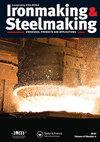基于LWOA-TSVR的转炉终点磷硫含量预测模型
IF 2.2
3区 材料科学
Q2 METALLURGY & METALLURGICAL ENGINEERING
引用次数: 1
摘要
转炉炼钢终点磷硫含量的精确控制是保证钢质量的关键。为了更好地控制转炉终点磷硫含量,建立了基于LWOA-TSVR的终点预测模型。并与BP、SVM和TSVR模型的预测效果进行了比较。结果表明,LWOA-TSVR模型在准确率上优于其他三种模型。并将该预测模型应用于某钢厂。结果表明,在±0.005%和±0.003%范围内,磷含量和硫含量的命中率分别为96.3%、81.7%和94.8%、76.9%。在±0.005%范围内,双命中率为:87.63%。结果表明,LWOA-TSVR预测模型能够有效地预测终点磷和硫含量,预测精度超过钢厂实际炼钢过程的预测精度。本文章由计算机程序翻译,如有差异,请以英文原文为准。
Prediction model of BOF end-point phosphorus content and sulfur content based on LWOA-TSVR
ABSTRACT Precise control of the end-point phosphorus and sulfur content in converter steelmaking is critical to ensuring steel quality. An end-point prediction model based on LWOA-TSVR is established to better control the BOF end-point content of phosphorus and sulfur. The prediction impact is compared to the models BP, SVM, and TSVR. The results indicate that the LWOA-TSVR model outperforms the other three models in terms of accuracy. And the prediction model is applied to a steel mill. The results showed that the hit rates of phosphorus content and sulfur content were: 96.3%, 81.7%, and 94.8%, 76.9% in the range of ±0.005% and ±0.003%, respectively. The double hit rate was: 87.63% in the range of ±0.005%. Thus, it is demonstrated that the LWOA-TSVR prediction model performs effective prediction of end-point phosphorus and sulfur content with prediction accuracy that exceeds that required by the real steelmaking process in a steel mill.
求助全文
通过发布文献求助,成功后即可免费获取论文全文。
去求助
来源期刊

Ironmaking & Steelmaking
工程技术-冶金工程
CiteScore
3.70
自引率
9.50%
发文量
125
审稿时长
2.9 months
期刊介绍:
Ironmaking & Steelmaking: Processes, Products and Applications monitors international technological advances in the industry with a strong element of engineering and product related material. First class refereed papers from the international iron and steel community cover all stages of the process, from ironmaking and its attendant technologies, through casting and steelmaking, to rolling, forming and delivery of the product, including monitoring, quality assurance and environmental issues. The journal also carries research profiles, features on technological and industry developments and expert reviews on major conferences.
 求助内容:
求助内容: 应助结果提醒方式:
应助结果提醒方式:


